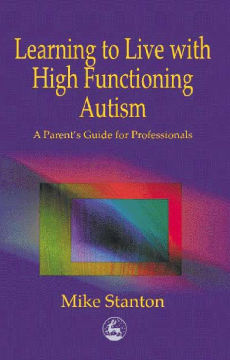
Additional Information
Book Details
Abstract
When his son, Matthew, was finally diagnosed with autism at 12 years old, Mike Stanton thought the diagnosis marked the end of their troubles. In fact, despite the increase in reported levels of autism, appropriate support and clear information were hard to find. Mike had to teach himself and then attempt to pass on his knowledge and understanding to those who worked with his son. But because Matthew has high functioning autism his obvious abilities helped to disguise his more fundamental autistic spectrum disorder. As a consequence, Mike found that his efforts were not always appreciated. Like many parents, who ought to be a valuable source of information and help to busy professionals, he was sometimes made to feel as though it was him and not his son's autism that was the problem. So he wrote this accessible, informative book which provides a clear explanation of the autistic spectrum and dissects and dispels some of the myths about autistic behaviour and the various types of autism.
Intended for the professionals who work with autistic people and their families and friends, Learning to Live with High Functioning Autism draws on the Stanton family's experience, and compares it with the experiences of others, to offer an honest portrayal of what living with autism is actually like for all of those involved. It offers an insight into the world of autistic children and the problems that they and their families face. It provides support and encouragement for families of children with autism, as well as being an invaluable source of information and advice for professionals working with autistic children and their families. Most important of all, it argues convincingly that learning to live with autism is a two-way process. We have to reject all models of intervention based upon coercion and compliance in order to work in partnership with young people with autism.
It is always a pleasure to read a book about autism written by a parent of a child with a spectrum disorder. Mike's book was no exception to the rule - indeed, quite the opposite. Mike's style, complimenting the seriousness of the subject matter with humour and personality, allowed for a hugely enjoyable and rewarding read. Mike's knowledge of autism plus his personal experience has given him an excellent basis for the content of the book. His ideas are stimulating, his style accessible, his dedication and humour inspiring. The book is a motivation to me, as a professional, to always question my own practice. Ultimately, the book is a `must read' for parents and professionals alike.
Luke Beardon, Regional Development Officer, National Autistic Society
I'm not one to give away a good story line, but this is a must read for anyone involved in helping, understanding or interested in persons with autism. Nothing gets by the eagle eye of Mike Stanton. Polemic? Sure, a little, but nothing not deservedly so. Useful information for persons with autism, parents and those working in the field ? Every word. This book should be on the shelf of everyone in the autism community and deserves to reach the community-at-large. Get it and get those friends who want to learn more about this great world autism community a copy too. No one could come away disappointed in Learning to Live with High Functioning Autism: A Parent's guide for Professionals by Mike Stanton.
Dennis Debbaudt
Mike Stanton teaches in a school for children with severe learning difficulties in the UK. Some of his pupils are children with autism, and despite the difference in ability he recognizes the similarities between them and people with high functioning autism like his son. Since Matthew was diagnosed with Asperger's Syndrome the whole family has been active in the National Autistic Society. Thus Mike brings both professional understanding and personal experience to the subject. He is, as he likes to style himself on Internet forums, `a parent and a teacher and learning all the time'.
Stanton highlights the costs to his family from a 'system' that understands little of ASD. Stanton, rightly, advocates for professionals to allow parents a bigger part in the whole process. Professionals, inexperienced in this specialist area would benefit from reading of the agonies families encounter in such situations. Stanton believed that with a diagnosis a 'support system' would open up - that it didn't, is of no surprise to those who are already involved with ASD. LEA officers would do well to read his suggestions on flexibility within the educational set-up. The issues raised by Stanton must be addressed by the services as a matter of urgency, if those with ASD are not to be discriminated against and have their needs adequately addressed in this age of inclusion.
Rosalyn Lord, Parent and Secretary of Action for ASD
